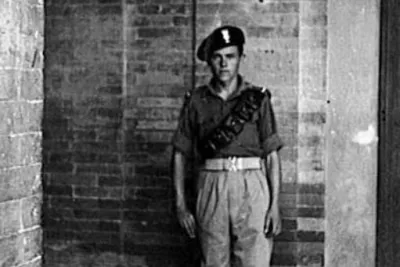Grade 8: Immigration and Historical Thinking
Saskatchewan – Why Did They Come Here?
Think of people who have moved to Saskatchewan from other places.
What reasons did they have for leaving their homes and moving here?
What has made Saskatchewan an attractive place for people to move to at different times in our past?
You can use primary sources to find out why people came here!
For example, an oral interview is an example of a primary source. A primary source was created by someone who was involved in or observed events being studied. Primary sources provide first-hand evidence of what people were thinking, how they lived and what was happening around them.1
Consider the interview excerpts found on this page, and ask yourself these questions...
- What do these passages suggest about the individuals being interviewed?
- What do these passage reveal to you about these individuals' reasons for leaving their homes and choosing Canada as their new home?
- What do these sources not tell you about the individuals' immigration journeys to Saskatchewan?
- What questions do you have about these individuals and their experiences that are not answered here?
1 Linda Connor, Brian Hull, Connie Wyatt Anderson, Shaping Canada (McGraw Hill Ryerson, 2011, p. 9.

Stan Gomulczak in his Polish military uniform, sometime between 1941-1944. PAS Tape R-500
Eva's Journey
I was at college in St. Catherine’s College in London, at Teacher’s Training College. While I was there, Bishop Lloyd of Saskatchewan came to give a lecture. His idea was really to encourage Christian teachers to come to teach in the rural schools of western Canada. Now I was very, very interested."
Stan's Journey
I was 13 years of age when Germany declared the war upon Poland, November 1st, 1939. February 10th, 1940, I was taken out by Russian army to the depth of Russia."
Isak's Journey
"Because of my educational standing and my accomplishment of assistant pharmacist, I would be eligible to go to university in Russia, but it was only a two percent norm. That means that out of 150 only 2 Jews would be accepted. And that’s why I figured I would have to wait about 100 years before I got there."
Charlie's Journey
The conditions in China were difficult. There were too many people in a village and I was anxious to help my parents."
William's Journey
I was apprenticed to electrical work…. The Boer War was on at that time and things were more or less booming there. And I took this job and I seemed to get along very satisfactorily…. But then the war ended. 50,000 men were discharged from Woolich Arsenal in one week. Everything went flat in that country…."
Curriculum
Saskatchewan Grade 8 Social Studies Outcome Focus: IN 8.2
Appraise the influence of immigration as a factor in Canadian cultural diversity.
a) Research reasons for diverse peoples choosing Canada as a home (e.g., economic opportunity, economic hardship or war in the country of origin, reunification of family, escape from religious or political oppression)
Historical Thinking Concepts:
Evidence – How do we know what we know about the past?
Guidepost 1: History is interpretation based on inferences made from primary sources. Primary sources can be accounts but they can also be traces, relics or records.
Cause and Consequence – Why do events happen and what are their impacts?
Guidepost 3: Events result from the interplay of two types of factors: 1. historical actors who are people (individuals or groups) who take actions that cause historical events and 2. the social, political, economic, environmental and cultural conditions within which the actors operate.